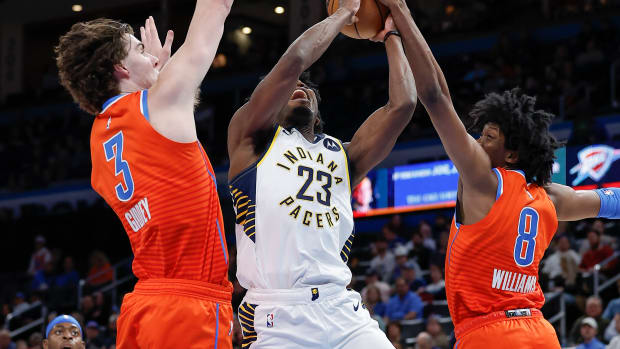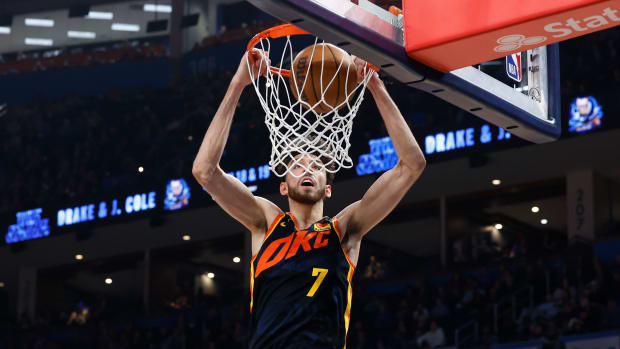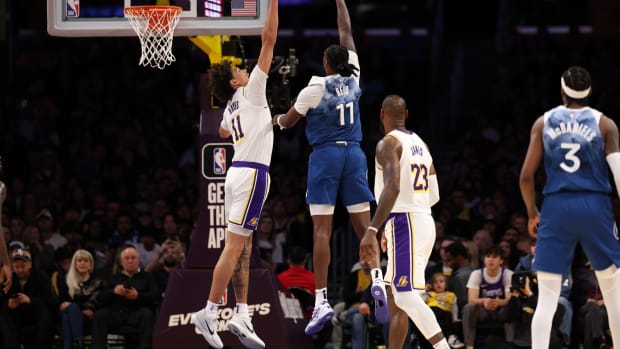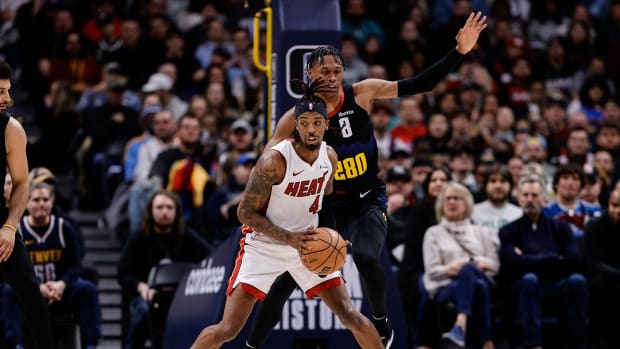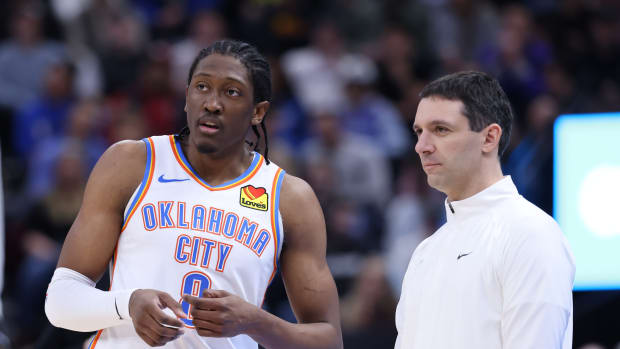Joel Embiid's Max Contract Isn't Strictly Boom-or-Bust Proposition
There’s a chance that Joel Embiid rewards Philadelphia’s patience and generosity by emerging as an All-Star, developing into the NBA’s best center, and making good on years of Process-inspired hopes. There’s also a chance that the injury-plagued center suffers a career-altering setback that leaves the Sixers hamstrung by his new $148 million rookie extension for a half-decade. But those aren’t the only two possibilities worth considering, and analyzing Embiid’s new deal solely through a boom-or-bust framework is a mistake.
It’s only natural for much of the discussion about a polarizing player and a debatable contract decision to gravitate towards the poles. But the truth for Embiid will almost certainly wind up landing somewhere in the middle, and there are a lot of possible scenarios that fall between superstardom and total disaster.
There's More to Dion Than Waiters Island
Embiid might average 70 games played per year over the course of his new deal. He might average 50 or 30. He might be beset by a series of minor injuries that never require surgery. He might need surgery that alters his athleticism in a way that he’s so far managed to avoid. His minutes might need to be managed for the duration of his contract. He might be free to play 35+ minutes and log both ends of back-to-backs. He might look like an All-NBA guy one night and a step slow the next. He might play two great years and then fade. He might lead the first post-Warriors dynasty and make the Hall of Fame. He might have a less productive career than Greg Oden.
After seeing Embiid suffer multiple season-ending injuries and play just 31 games through three seasons, that entire range remains on the table. There’s no benefit of the doubt to grant him, even though he’s engaging, occasionally funny, and a tailor-made leader.
Philadelphia’s contract will be just fine if Embiid delivers on his top-end potential. The 23-year-old center averaged 20.2 PPG, 7.8 RPG and 2.5 BPG last season, simultaneously looking like an unstoppable scoring machine and a one-man defense. Embiid, in theory, is an obvious max guy. On the other end, committing to Embiid early leaves the Sixers exposed in a major way to a worst-case scenario. This extension won’t kick in until the 2018-19 season and could run through 2022-23. Even if the as-yet-unknown injury protections built into the contract prove to be significant, Embiid could wind up representing a lot of dead salary for an awfully long time.
But consider how willing any team should be to commit to a deal that could easily prove unwise even if it doesn’t totally backfire. It’s hard to justify a max contract to any player who averages fewer than 60 games. It’s hard to justify a max contract to any player who can’t sustain 30+ minutes a night. And it’s really hard to justify a max contract to a player who has taken the court for 13 total wins in three seasons. Embiid doesn’t have to crash and burn for this deal to disappoint. In fact, he could play twice as many games this season as he has during his entire career, scale up his production and impact, and, depending on his ability to handle minutes, still be a debatable max candidate.
After all, the greatest ability is availability, and a star’s unreliability can sidetrack a team’s entire season and undermine a franchise’s long-term planning. It’s hard to imagine that the protections that Philadelphia negotiated into this deal will prove to be more beneficial than having six or seven months to evaluate Embiid’s play, health, and ability to withstand a heavy workload.
NBA Power Rankings: Preseason Ratings for All 30 Teams
By waiting until next summer to ink Embiid, Philadelphia would have been looking at similar polar endpoints: He would be a max guy in a best-case scenario and a super-risky, oft-injured 7-footer in a worst-case scenario. But waiting likely would have distilled the range of possibilities between those poles.
Let’s say Embiid only plays 50 games. Would outside teams really offer him a full max contract? Would Philadelphia be as inclined to make a max commitment? Now, what happens if he only plays 30 or 40? Or, what happens if he plays 65 games but can’t sustain his peak play and impact over the course of six months? The risk calculus might not tilt overboard one way or another, but it could very well crystallize to a point that falls short—perhaps well short—of Philadelphia’s current financial commitment. Of course, if Embiid plays 75 games at an All-Star level, the Sixers would be positioned to shell out max money while enjoying additional peace of mind.
2017-18 NBA Entertainment Rankings
The NBA’s restricted free agency setup favors teams because it allows them to commit early to stars to set the course for their franchise’s future, or to hold off on tricky decisions until after first-round picks have played four full seasons. Here, Philadelphia passed on its incredibly valuable evaluation time without actually setting a course for the future. The Sixers’ fortunes are now tied more than ever to Embiid’s ability to stay healthy. No one, not even Embiid and his most diehard fans, can comfortably predict how that will play out.
This would be easier to stomach if Philadelphia was still stuck in the middle of a completely hopeless eternal rebuild. But the Sixers have added Ben Simmons and Markelle Fultz in the past two drafts, and their ability to refashion their roster around those two potential franchise talents if Embiid goes down again is now significantly more complicated.
With this deal, the Sixers have hoped for the best and taken some steps to prepare for the worst. But they’ve also left themselves wide open to disappointment that could be doled out in smaller or less dramatic doses. Rather than maximizing their negotiating position by waiting to improve their knowledge of Embiid’s health and durability, they walked into a dark alley with their fingers crossed. Doom may or may not be waiting for them, but why chance it?






























